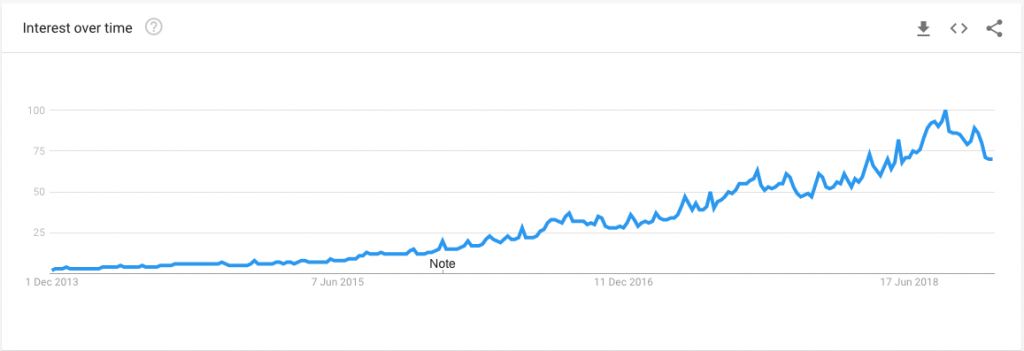3 min read
Honchō Scoops Up Two UK Search Awards!
It’s official, we've added not one, but two shiny trophies to our awards cabinet! We’re over the moon to share that we’ve triumphed at the UK Search...
3 min read
 Jade Halstead
:
Dec 3, 2018 8:00:30 AM
Jade Halstead
:
Dec 3, 2018 8:00:30 AM
On the third day of Christmas Honchō gave to me a local search strategy… From Google My Business to on-page optimisation, Cameron, our SEO Executive, looks back at the most relevant areas that topped the list of local search strategies across the SEO industry.
Local search is continuing to grow and remains a staple in any good SEO strategy throughout 2018 and into 2019, and it’s no surprise. A study by BrightLocal has found that 46% of all Google searches have local intent, highlighting a huge opportunity to capture additional traffic if you or your clients offer a product or service in the local area.
Local SEO tactics are becoming prominent amongst local webmasters, and the days of only those in the SEO industry optimising for local searches are fading away. Although this is great for local companies, it has drastically increased the competitive landscape and securing your visibility is not as easy as it used to be. However, there are still actions to be taken to increase your chances of dominating the local search results for your relevant queries.
Let’s take a look back at the key focus areas that have been relevant throughout 2018…
It’s as important as ever to ensure that your GMB profile is up-to-date with the most accurate company and contact information and that your location and opening hours are correct. In today’s search landscape, a user searching for “mechanic near me” will be provided with multiple local companies offering competitive services. To remain competitive and appealing to this user you need to consider the quality of your reviews (Are they mostly 5-star or 2-star?), the number of reviews, the amount of company data you provide (Have you linked to your website? Are you displaying contact details and opening hours?) and your proximity to the user at their point of search.
Unfortunately, we can’t influence the latter, but fully optimising your GMB profile is an action that not only is in your control but can have a positive effect on your local performance. According to Google data, there has been a 200%+ growth in mobile searches for “Open” + “now” + “near me, which highlights the importance of having accurate company information on your profile.
In some SEO circles you may hear talk and advice surrounding optimising for ‘near me’ terms, e.g. “hotels near me” or “car dealer near me”, but this isn’t a strategy we would recommend.
It’s definitely true that ‘near me’ searches are continuing to grow in popularity. As we can see below, search terms in the UK containing ‘near me’ have continued to grow consistently over the last 5 years, and although this does highlight a clear opportunity, you must consider which strategy you will adopt to target these searches.

Furthermore, mobile searches that contain ‘near me’ and a variant of buying intent such as ‘to buy’ have grown over 500% from 2015 to 2017. Google data also shows us that mobile searches for local events and attractions plus ‘near me’ have grown over 500% in the last two years alone.
This data proves how valuable local SEO efforts are to the longevity of organic performance for local-oriented companies. To target these searches you will first want to begin conducting your keyword research from the local area that you are in and find the volume of relevant searches containing these terms, as this will highlight your opportunity.
Following on from targeting ‘near me’ terms, it’s important to optimise your key pages for relevant local searches. Let’s say you are a car dealership in Liverpool, and your keyword research shows that the term ‘car dealership near me’ has an average volume of 320 searches per month (as of November 2018). You may be tempted to optimise your homepage for ‘car dealership near you’ as on-paper this satisfies the query and of course, Google knows your geo-location, right? The answer is yes… and no.
Best practice is to target the location itself and maintain consistent targeting across all on-page optimisations. Target Liverpool in your Title and H1 tags, state your address clearly on your website, create your GMB profile with a link to your website, and as a bonus, you can also work on building local relevant citations!
All of the above are signals that Google will take into consideration when displaying results to the user. So, the more signals you can provide that show clearly that you are within the correct area and can satisfy the query intent the better your chances are of appearing.
For a more granular approach, and if you have multiple locations, then you can target more specific areas within your county, city, or town to capture more traffic.
**
So, there we have it. Although the information above may not be an exclusive list of all local search factors that have been consistently important throughout 2018, it’s certainly a good starting point for your local SEO efforts to help make 2019 your best year yet.
Tweet Honcho_Search and let me know your thoughts on local search. Have a very merry Christmas one and all!

3 min read
It’s official, we've added not one, but two shiny trophies to our awards cabinet! We’re over the moon to share that we’ve triumphed at the UK Search...

5 min read
Understand ecommerce attribution models which attribution models can maximise your marketing efforts and ROI.

3 min read
Explore how social commerce is changing the way we shop online, blending social interactions with digital commerce for a seamless buying experience.